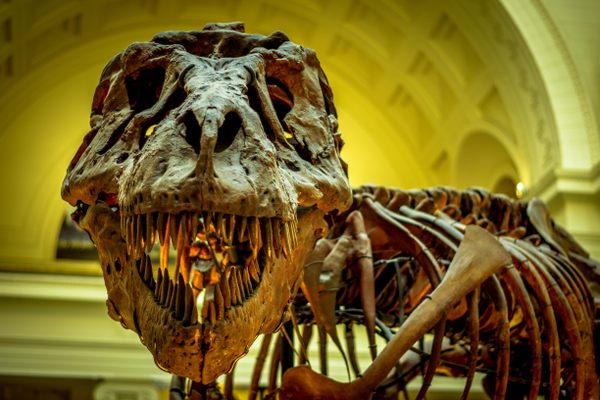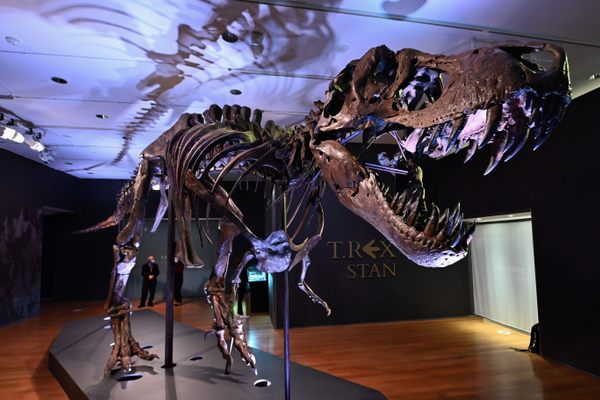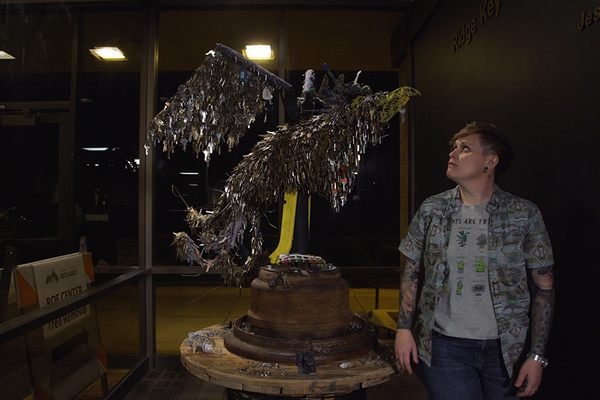California Finally Has an Official State Dinosaur, Not a Moment Too Soon
A duck-billed hadrosaur joins an exclusive club of extinct state symbols.
Duck-billed hadrosaur Augustynolophus morrisi—whose 66-million-year-old fossilized remains have only been found only in California—was officially declared the state’s oldest representative thanks to a bill signed by Governor Jerry Brown on Saturday.
California has a state dinosaur! Meet @Augustynolophus morrisi last seen 66 million yrs ago, b4 asteroid hit Earth. https://t.co/D829rCzgtX pic.twitter.com/D4lnGDf4Y9
— 89.3 KPCC (@KPCC) September 23, 2017
The bill was put forward in April by Santa Monica Assemblymember Richard Bloom, and posits that Augustynolophus morrisi “is essential to California’s society because it nurtures an educational opportunity for the youngest Californians to become interested in paleontology,” and science in general. The herbivorous hadrosaur joins a select club of 10 other dinosaurs that are state insignias (not to be confused with state fossils). Colorado was the first to claim one, the stegosaurus, in 1982. Texas is on its second, after changing from astrodon to sauroposeidon in 2009, and Iowa claimed the coveted tyrannosaurus in 1992. Oh, and D.C. has the capitalsaurus, known only from a single piece of bone found there during the McKinley administration.
According to Benjamin F. and Barbara S. Shearer, in their book State Names, Seals, Flags, and Symbols: A Historical Guide, state insignia started to become a thing in the 1920s and 1930s primarily as symbols of civic pride. Imagine a local garden club asking its state to recognize an official state flower. But it was really during the postwar consumer boom that they started to blossom: “Lots of states were adopting the symbols as ads for the state,” Benjamin Shearer told ABC News in 2011. That’s why tomato-growing Ohio has the tomato as its state fruit and tomato juice as its official drink, or why snowy New Hampshire made skiing its official sport.
Some connections between states and their symbols are a little less intuitive. Utah, for example, picked Jell-O as its official state snack not because the state produces the dessert, but because it ranks first in the country in per capita Jell-O consumption. “WHEREAS,” the resolution declaring it so reads, “Jell-O® is representative of good family fun, which Utah is known for throughout the world.” Senator Mike Lee and his staff even host weekly “Jell-O with the Senator” sit downs in Washington, D.C.
Food and civic pride both feature in New Mexico’s state question, “Red or Green?” (your choice of chile), as well as the six states with official crustaceans: Louisiana’s crawfish, Maryland ‘s blue crab, Oregon’s dungeness crab, Alabama’s brown shrimp, Maine’s lobster, and Texas’s gulf shrimp. Speaking of animals, only three states—Texas, Virginia, and Hawaii—have official bats. North Carolina tried join the that club in 2015, but the resolution to recognize Rafinesque’s big-eared bat didn’t make it.


















Follow us on Twitter to get the latest on the world's hidden wonders.
Like us on Facebook to get the latest on the world's hidden wonders.
Follow us on Twitter Like us on Facebook